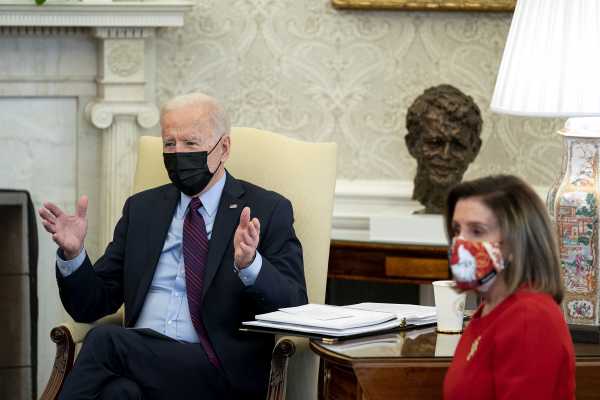
Democrats have gotten over an important hurdle in Covid-19 relief: The House of Representatives just passed its version of the $1.9 trillion stimulus package, sending it off to the Senate.
The bill passed around 2 a.m. on Saturday morning, in a 219-212 vote, with every Republican voting no. Democratic Reps. Jared Golden of Maine and Kurt Schrader of Oregon also opposed the bill.
The bill includes some big-ticket items that would deliver important relief to businesses, workers, and the broader economy. It includes $1,400 stimulus checks for those making up to $75,000, $400 expanded weekly unemployment insurance benefits through August 29, and billions of dollars for arenas such as schools, state and local governments, and restaurants. It also increases Affordable Care Act subsidies for low- and middle-income Americans and expands both the child tax credit and the earned income tax credit.
The bill also includes a $15 federal minimum wage, though the provision is dead in the Senate. The Senate parliamentarian ruled on Thursday evening that the minimum wage hike cannot be passed under the rules of budget reconciliation.
In a statement on Thursday, House Majority Leader Steny Hoyer (D-MD) said he is “deeply disappointed” in the ruling but noted that House Democrats will pass the bill as is, even though it will ultimately change in the Senate. “Gradually raising the minimum wage to $15 an hour remains a centerpiece of House Democrats’ economic plan and would provide a major boost in income to 27 million Americans while lifting nearly a million out of poverty,” he said.
Senate Democrats are considering some workarounds on the minimum wage, though it’s unclear if they will stick.
Now that the House has passed a version of the bill, it will head to the Senate, which is likely to make some changes to the text. After that, it’s likely to get bounced back to the House, which would need to pass whatever the eventual agreed-on version of the legislation would be before it lands on President Joe Biden’s desk. The clock is ticking: Expanded and extended unemployment insurance under the last $900 billion stimulus package, passed in December, ends on March 14. Democrats do not want to push workers off an unemployment cliff.
You can find a complete look at what’s in the House bill here.
Sign up for The Weeds newsletter
Vox’s German Lopez is here to guide you through the Biden administration’s unprecedented burst of policymaking. Sign up to receive our newsletter each Friday.
Democrats are taking a big swing here
Biden first introduced his proposal for a sweeping $1.9 trillion Covid-19 relief package in January, which the congressional plan largely mirrors. Democrats and many economists have for months argued that the risk on the federal government’s pandemic response is doing too little, not too much, to help the country and the economy. Many lawmakers feel the government undershot its response to the 2009 Great Recession and incorrectly assumed they’d have multiple chances at major legislation. They’re determined not to make that mistake this time around.
“We can’t do too much here,” Biden told reporters in the Oval Office in early February. “We can do too little and sputter.”
Democrats, including the president, have argued that it’s an important moment for deficit spending to help people in need, also noting that interest rates are low and are expected to stay that way for quite some time. “Every major economist thinks we should be investing in deficit spending in order to generate economic growth,” Biden told reporters in January.
To be sure, Democrats and the White House have received some pushback.
Republicans have broadly criticized the Democratic proposal. A group of 10 Senate Republicans put forth a counteroffer to Biden’s $1.9 trillion package, proposing instead a $600 billion bill that would have addressed some immediate public health needs, such as vaccinations and testing, and food aid. But it shrank spending in areas such as unemployment, stimulus checks, and schools, and left out state and local aid altogether.
Some economists who are more centrist or even Democratic have questioned whether the legislation is too ambitious. Larry Summers, an economist who served in both the Clinton and Obama administrations, wrote an op-ed warning the bill might cause future inflation or make less politically palatable further stimulus. Summers’s concerns, while not out of left field, are not necessarily widely shared — many economists pointed out that a little bit of inflation would indeed be good, and the Federal Reserve has tools to combat it.
Before Summers’s op-ed was posted, Austan Goolsbee, another Obama economic alum, published an op-ed in the New York Times warning that the country could fall into a double-dip recession, meaning the economy could get better and then fall again, and called for a proactive response from the federal government. He wrote that a “wait and see” approach on a relief program “has been proved to be deeply wrong since the pandemic began,” and noted that the virus has caused people to withdraw from the economy. “Much damage has already been done — and it is evident not only in lost jobs but in lost income and lost companies,” he wrote. “This harm could have been prevented. It definitely should not be repeated now.”
There is plenty of space to debate what’s in the legislation, what should be there and what should not. Some provisions, such as higher ACA subsidies, the expanded child tax credit, and the expanded earned income tax credit, are only temporary, and it’s unclear whether they’ll last beyond the next year or two. The House bill cut off a month of expanded unemployment insurance, which Biden initially proposed extending through September. Democrats also opted against including automatic stabilizers in the bill, which would tie supports such as unemployment insurance to economic conditions rather than arbitrary end dates.
That the House has passed a version of the package doesn’t mean the process is over — there’s still quite a way to go before it lands in the Oval Office — but it’s an important step.
Sign up for The Weeds newsletter. Every Friday, you’ll get an explainer of a big policy story from the week, a look at important research that recently came out, and answers to reader questions — to guide you through the first 100 days of President Joe Biden’s administration.
Help keep Vox free for all. Make a contribution today.
Sourse: vox.com






